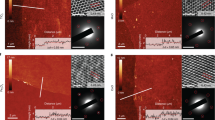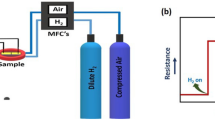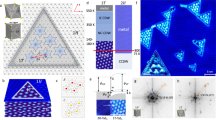Abstract
IT has been shown1–3 that a monolayer of certain metals can be deposited on a platinum electrode at a potential somewhat removed from that at which bulk deposition takes place. It has further been shown3 that the resulting monolayer is bound to the platinum substrate by “metallic” bonds.
This is a preview of subscription content, access via your institution
Access options
Subscribe to this journal
Receive 51 print issues and online access
$199.00 per year
only $3.90 per issue
Buy this article
- Purchase on Springer Link
- Instant access to full article PDF
Prices may be subject to local taxes which are calculated during checkout
Similar content being viewed by others
References
Bowles, B. J., Electrochim. Acta, 10, 717 (1965).
Bowles, B. J., Electrochim. Acta, 10, 731 (1965).
Bowles, B. J., and Cranshaw, T. E., Phys. Lett., 17, 258 (1965).
Wells, A. F., Structural Inorganic Chemistry (Clarendon Press, Oxford, 1945).
Author information
Authors and Affiliations
Rights and permissions
About this article
Cite this article
BOWLES, B. Packing Density of Atoms in Metallic Monolayers on Platinum. Nature 212, 1456–1457 (1966). https://doi.org/10.1038/2121456a0
Issue Date:
DOI: https://doi.org/10.1038/2121456a0
This article is cited by
-
Underpotential deposition studies of copper on glassy carbon
Proceedings / Indian Academy of Sciences (1986)
Comments
By submitting a comment you agree to abide by our Terms and Community Guidelines. If you find something abusive or that does not comply with our terms or guidelines please flag it as inappropriate.



